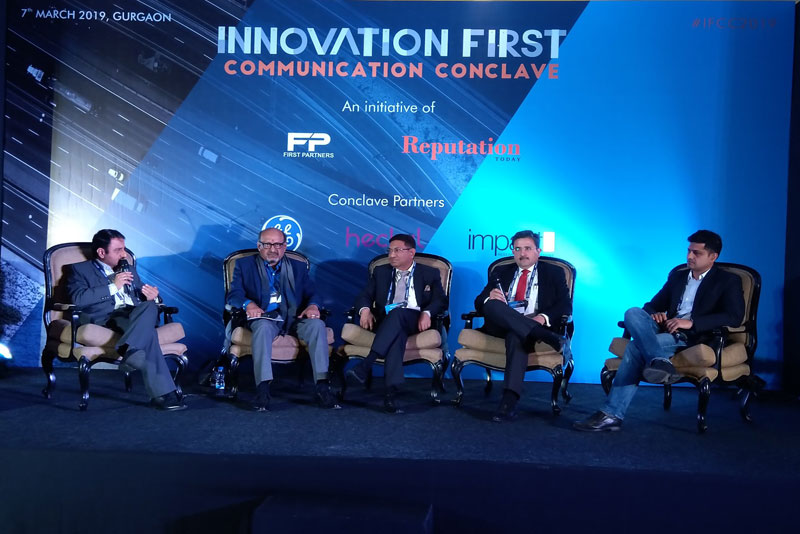The subject of innovation in communication today is among the top agenda items for communicators, whether they represent large global corporations, new age start-ups or mid-sized local enterprises. A decisive paradigm about innovation in the business context is that it must deliver business success. It is the business returns that become the raison d’etre to invest in innovation. The discipline of communication should be no different. Innovative communication must get its creators top-level business results.
To decode the art and science of innovation in communication, to us, the starting point is the end – the business results. The organisational stakeholder group that is aptly informed of and deeply invested in this is the CFOs who are the natural custodians of business and financial success of organisations. Therefore, for the next edition of India Innovation Outlook in 2019, which is the only study of its kind from India on innovation in communication, we decided to focus on the views of the CFOs’ with respect to the two magic words important to all of us – business success and communication.
Innovations are built on the foundation of insights. Deep insights. By their very definition insights come from the most unusual sources. The India Innovation Outlook 2019 has therefore been designed to look beyond the legacy CXOs – the communicators, marketing heads, and CEOs. It seeks to engage with the CFOs whose roles are taking an interesting turn in the evolving hyper-complex environment. Financial leaders have to constantly deal with the daunting task of delivering continuous financial success in a fluid and disruptive environment. The definition of business success is also going beyond just being limited to financial success to including the creation of stakeholder value beyond the shareholders and investors. Today, company reports are displaying stakeholder value as key metrics, and financials are being relegated to customary number narratives.
The India Innovation Outlook took upon itself the daunting task of getting CFOs onboard for a discussion on communication, a subject many of them find confounding to speak on. This needed a qualitative deep dive discussion as well as quantification of key responses to develop clear trend lines. The second big challenge in conducting this study was to convert the complexity of the sum-total of business success metrics, into a simplicity which clear, innovative communication could operate with.
The study deals with a number of very relevant issues. Among these, there are four broad aspects which need special mention. First is the definition of business success itself. How much of financial success is embedded into business success. Can it be something else altogether, like intangible factors such as brand value or stakeholder perceptions. The objective minds of finance leaders cannot deal with subjective derivations; hence all subjectivity must converge to clear objective deductions. This aspect has been particularly helpful in reaching some very pertinent conclusions for communicators.
The second factor is that singular something which bothers the financial leaders the most and is what makes them lose their sleep the most. Also, it is relevant to understand if communication can play a role in addressing this factor and give them some peace of mind. The responses here point to a very interesting communication connect. It is further interesting to note that communication can be a big help in converting variables into constants for the financial leaders. Communicators, through their long careers, are trained to successfully navigate through fluid media environments, and this trait can be of extremely good value to today’s CFOs who are dealing with uncertainties of a new order.
Thirdly, a key factor is a direct enquiry on how communications can partner with CFOs to deliver business success. Whether communication has an unambiguous role to play, or can it only make a tangential contribution? That the former is not the answer is obvious, but the extent and the nuance of communication’s supportive role, and how it can quickly move from the periphery to the core is interesting to learn. This is where the insights and findings take a new turn, with clear take-aways on how to put communication at the very heart of the business success process.
The fourth, and the most important, factor is the investment question. Communicators often have a grievance that their programmes do not get all the requested budgetary approvals, or that budgets could be enhanced. This is not because the business leaders do not see value in communication. This happens because they see a confined value in the communication function much because the linkage between communication and business success is often fuzzy to them. If business leaders saw communication as a source of continuous business success, the financial investment story could be entirely different. This is where CFOs have some very interesting insights to share. These relate to the situations and circumstances which can make business leaders loosen their purse strings and make this an ongoing phenomenon; and also how growing investments are not limited to just a few projects or situations but become a fundamental part of their company’s strategy.
The answers and insights to the above questions would be presented in the findings of the study to be unveiled at the Innovation First Communication Conclave 2019 being hosted by this publication, the registrations for which are now open. Communicators can expect to discover a brace of new findings which should help expand their field of understanding, along with a further sharpening of their existing knowledge skills consistent with experience and common business wisdom.
For more conversations around Innovation (if you are an in-house communications professional), attend the Innovation First Communication Conclave in Gurgaon on Thursday, March 7th, 2019.






